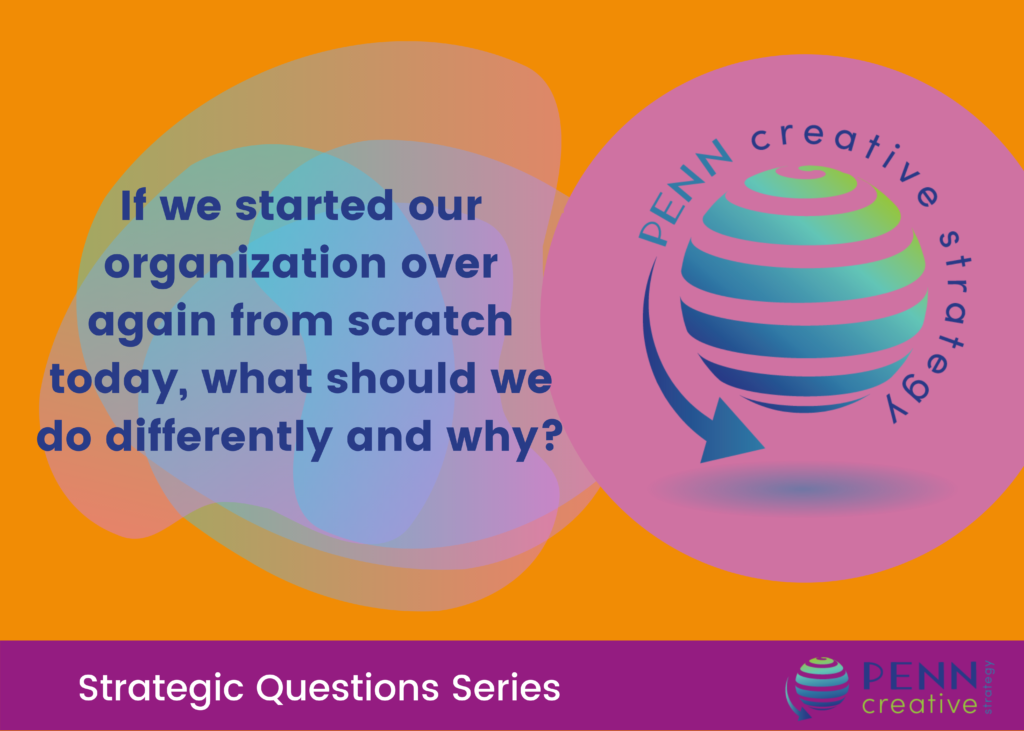by Molly Penn
How do we ensure that planning = intentional and strategic change? Simple. Every good planning process needs to be rooted in a set of powerful strategic questions. Do your change initiatives feel like business as usual to you? If so, you are missing an opportunity to think about planning as an opportunity for organizational change and intentional growth. Without a plan, your organization will change and grow anyway, but it might not be in ways you want.
As Eugene Ionesco suggests, “It is not the answer that enlightens, but the question.” The art of asking questions is not necessarily about finding the answer, but about framing questions that encourage us to lean into exploration, dialogue and relationship building. There is value in framing questions that may even seem impossible to answer. Think of the Bard, who wrote in Hamlet’s soliloquy “To be, or not to be: that is the question.” What makes that line so memorable is that it provoked his further exploration of the meaning of life. If Hamlet had gone on to answer that question, it would be a forgotten line of Shakespeare. Planning provides us an opportunity to ask ourselves important and existential questions about our organizations that help us discern the best path forward.
How to Frame Good Questions
Often, organizations are in a rush to dive into collecting the information needed to help them resolve their future focus and they don’t spend enough time up front framing good questions. We often hear questions like “how can we become better known?” put forth as a strategic question. While we appreciate how compelling that feels, especially to people more accustomed to the for-profit world, we don’t see that as a compelling, existential question. Here are some of our favorite criteria for vetting good strategic questions:
-
Is this a question to which we really don’t know the answer? Is it thought provoking?
-
Is this question likely to invite fresh thinking? Is it sharp enough to call forward a new response?
-
Does this question generate energy?
-
Does it dislodge old thought patterns or assumptions?
-
Which of these questions are most critical for us to answer, or most controversial and need resolution?
-
Which are the ones we know least about?
-
Which are the core questions we must address in order to proceed with developing a truly strategic plan – one that responds to the state of the world outside our organization?
-
Why is this important now?
Who Should Be Involved in Developing the Questions?
When doing any kind of planning initiative, there is a planning committee – a small group of organizational insiders (board and staff) who have the best vantage point on the issues at play. Insiders, by nature, are most prone to group think, which is characterized by unquestioned assumptions, rationalizing, stereotyping & bias, and pressure to conform. Not every group of insiders falls prey to this, but it tends to happen most often when limiting the group to insiders. What if we included audiences or constituents with important vantage points, or competitors, or funders who don’t fund us, or thought leaders in other related fields, or activists, or researchers? In fact, what if we convened these non-traditional stakeholders in a mini planning summit to help us frame the best questions to guide the planning effort? Consider the fruits such a discussion might yield!
We encourage our clients to think broadly about this beginning phase of the project and not rush through it. It can be easy to fall prey to a sense of urgency, but that will constrain our thinking. Think of it this way: the biggest danger is to frame “typical” questions, which are then researched, and the findings don’t contain any new information!
We have developed a deck of strategic question cards to get you started in the right direction. Contact us if you are interested in buying a deck to share with others in your organization or with a planning committee. Or, contact us if you want to make sure your next planning project leads to real change.

